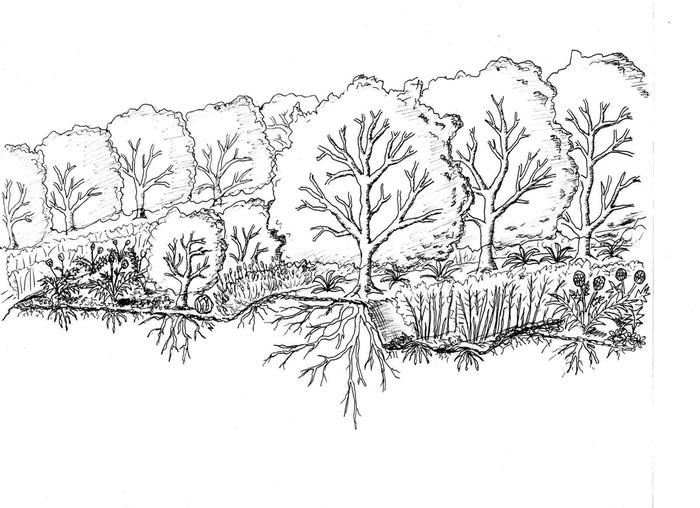
 1
1












SE, MI, Zone 5b "Opportunity is missed by most people because it is dressed in overalls and looks like work."
~Thomas Edison
 4
4




The ultimate goal of farming is not the growing of crops, but the cultivation and perfection of human beings. - Masanobu Fukuoka
 3
3




Yes, I'm that David The Good. My books are here: http://amzn.to/2kYcCKp. My daily site is here http://www.thesurvivalgardener.com and my awesome videos are here https://www.youtube.com/subscription_center?add_user=davidthegood








Yes, I'm that David The Good. My books are here: http://amzn.to/2kYcCKp. My daily site is here http://www.thesurvivalgardener.com and my awesome videos are here https://www.youtube.com/subscription_center?add_user=davidthegood





SE, MI, Zone 5b "Opportunity is missed by most people because it is dressed in overalls and looks like work."
~Thomas Edison










Sustainable Plantations and Agroforestry in Costa Rica





Idle dreamer












Willy Kerlang wrote:I am in the process of re-reading The Good Life and the sequel right now. Although the Nearings did believe they needed to make enough money to live, they strongly deplored the need to do so, especially on the terms of a capitalist society.









Willy Kerlang wrote:I do feel rather strongly that healthy, natural food is a basic right and not a luxury.
the only thing that would make the price of natural food drop would be if the supply were to go up--hugely up.
Is it not true that natural, organic food is a right and not a luxury?
What if all farms in the US and Canada were to magically switch over to Fukuoka-style growing tomorrow, just for the sake of argument--would they not find their costs drop significantly, regardless of subsidies, while at the same time their yields stayed the same or went up? Would this not therefore mean that healthy, organic food would then be able to be sold at a lower price than agribiz food is today?
Hey, I can dream.




John Meshna (owner)
Blue River LLC
1195 Dog Team Road
New Haven, Vt 05472




John Meshna wrote:I think if we took away all the subsidies involved with conventional agriculture things would change.
 There is no way they could continue farming the way they do without government support. But maybe they could then become permaculturists instead of breaking their hearts and going bankrupt anyway in a system which doesn't give a rat's ass about farmers, only about profit.
There is no way they could continue farming the way they do without government support. But maybe they could then become permaculturists instead of breaking their hearts and going bankrupt anyway in a system which doesn't give a rat's ass about farmers, only about profit.Idle dreamer




Tyler Ludens wrote:I think Fukuoka's idea of naturally-grown food being cheaper was philosophical rather than practical. Most people in our modern society aren't going to be willing to live in a simple hut with no modern conveniences like he had at his farm. If we did our expenses would be minimal and so we wouldn't need to sell produce for more. From my own point of view, in an ideal world we wouldn't need to sell it at all but could just give it away, with our work and our produce being of such value that people would give us the resources we need to live (like money for property tax). This is my ideal of the Sharing or Gift economy, but is difficult to implement in the present society and is considered impractical by many.













John Seay wrote: ten acres of land. This isn't a lot of land by any means; but it is enough to produce food for my family, my friends, and myself.
 ), enough food for 100 people could be grown on ten acres! Except ten acres in Biointensive would be far more land than one person could manage alone....
), enough food for 100 people could be grown on ten acres! Except ten acres in Biointensive would be far more land than one person could manage alone....
Idle dreamer
 1
1




Dale Hodgins wrote: His fish are better so he can charge more.




John Seay wrote:This is very possible. With a move to a more perennial crop system and a little bit of luck there could be plenty of cheap food if those producing it were willing to take less money. This is exactly what I'm trying to do now. I live with almost zero cost (compared to most people) and have been blessed with my parents allowing me to farm their ten acres of land. This isn't a lot of land by any means; but it is enough to produce food for my family, my friends, and myself. I'm working towards being able to produce more, longer to be able to sell food much cheaper than anyone I've seen. My idea is that I currently live off of $400 a month. If I make more than that selling produce then I'm making a profit. I would like to still be able to buy more land so I would need much more than that to be able to save up enough. I believe a lot of the issues is that people aren't getting into natural farming young enough. Starting young, networking, and refusing to use banks is key to producing cheap food. Not everyone would be able to do this of course; butsomecan. If some can then yes, it is possible.
 1
1




Walter Jeffries wrote:
Willy Kerlang wrote:I do feel rather strongly that healthy, natural food is a basic right and not a luxury.
Walter Jeffries wrote:I'll have to differ with you on that. According to nature, evolution and natural selection we have no basic right to any of that. If you want it you'll need to work for it. If someone works harder they'll get it. If the resource is limited and they work harder than you then you may not get it. That is the natural order of things. The only reason the lion lays down with the lamb is to dine on it. This is pretty fundamental. People can idealize all they want but billions of years of nature prove otherwise. Ideology is fleeting and tends to be the dogmatic death of karma.
I've been thinking about this response for a couple of days, and I've come to the conclusion that there is something inherently troubling in it for me. I won't deny that you are right. It is certainly true to say that access to food has always been a bone of contention among different groups sharing the same territory, and has been one of the root causes of many a war. It's probably always been true that the more powerful a person or group, the readier access they have to food that is higher in both quantity and quality. And it's true to say that access to food has never been guaranteed to anyone, by the ancient law of might makes right. If I am stronger than you, and my tribe is more numerous than yours, then I am going to take over your hunting lands or your fields, and you are either going to be destroyed or assimilated. This is essentially the law of the jungle.
So I am not disputing the accuracy of what you are saying. This is not what troubles me. I think what troubles me is simply that it's true. These days, in our society, the law of the jungle is played out economically rather than physically. The poor and weak of our society don't eat as well as the rich and powerful. The pie-eyed hippie in me thinks it would be very nice indeed if everyone could afford a free-range chicken or a bowl of greens guaranteed to be pesticide free. The cynical observer in me (I will not use the term "realist", since that is always how people refer to themselves, while people who disagree with them are always accused of "not living in reality") understands that the societal changes required to guarantee good, cheap food are probably insurmountably hard to achieve, and in fact likely go against human nature.
This is why someone like Fukuoka holds such fascination for me, because here he is holding up what is essentially a solution not only to the problem of world hunger, but also to ill health in affluent societies such as our own. I am not offering my own brilliant solution, because I don't have one, nor am I even making much of a point here. I just think that Fukuoka's method was about far more than growing healthy food efficiently, and that he understood the law of the market quite well but chose to disregard it. He was trying to be the change he wanted to see in the world, and at that I think he succeeded.
So, I don't think it's reasonable to tell organic farmers that they should start charging less for their food because it would be the virtuous thing to do. But I do think that Fukuoka-style farming should be promoted above all other methods, with adaptations as necessary for climate. As others have pointed out, if the supply goes up, the cost will go down. More people eating healthier food means a healthier society, and in that scenario everyone wins.
And that's what I have to say about that. Thank you all for participating in this most interesting discussion. It's proven to be very enlightening.




Idle dreamer




 1
1




Jonathan Fuller wrote: Actuall market price, in a 'free market' system depends purely on supply/demand.
Idle dreamer
 1
1




find religion! church
kiva! hyvä! iloinen! pikkumaatila
get stung! beehives
be hospitable! host-a-hive
be antisocial! facespace





 1
1




Terri Matthews wrote:
In my opinion, he was able to sell the fruit for less because he did not pay his pickers anything other than a hut to sleep in and a vegetarian diet.
find religion! church
kiva! hyvä! iloinen! pikkumaatila
get stung! beehives
be hospitable! host-a-hive
be antisocial! facespace




That is exactly what they were: they worked for him without pay and then they went off and very often started their own farms.tel jetson wrote:
Terri Matthews wrote:
In my opinion, he was able to sell the fruit for less because he did not pay his pickers anything other than a hut to sleep in and a vegetarian diet.
reminds me of the widespread practice of interning people on organic farms around here. or taking on interns. or something like that. I'm not a fan.












Tyler Ludens wrote:
Jonathan Fuller wrote: Actuall market price, in a 'free market' system depends purely on supply/demand.
But such a market has never existed. It's an ideal, or an idea. Prices are set by humans. I can, as a human, decide to price my product lower than a competitor's price for a variety of reasons; my costs are lower, I don't feel like charging my customers up the wazoo, I have a sharing philosophy, etc.




That being said, I think organic farmers should charge just as much as the market will bear for the products they produce if for no other reason than because when a conventional farmer sees his/her organic neighbor pulling twice the profit of the same size land they will think strongly about switching.
Scott H.
Check out my house project!

|
Now I am super curious what sports would be like if we allowed drugs and tiny ads.
The new permaculture playing cards kickstarter is now live!
https://www.kickstarter.com/projects/paulwheaton/garden-cards
|








